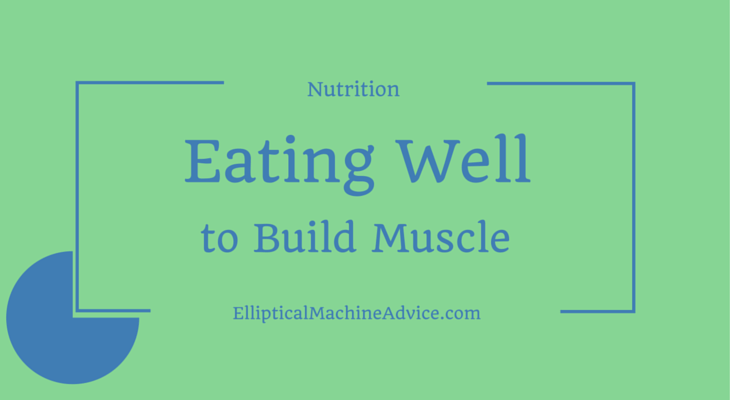A Nutritious Diet: Your First Step to building Muscles
Rock hard six pack abs and tight, defined biceps – we all want them, but not all of us are willing to work towards them. And with good reasons. Building muscles can be difficult even if you are determined. In fact, it can be scary at times, there always seems to be strings attached.
Everyone wants to build muscles and improve strength, not only fitness enthusiasts but also anyone who wishes to look into the mirror and say, “I love my body.” But – and that’s a big but – most of us frown at the idea of eating more to add lean mass, even if it’s nutritious foods. A balanced, nutritious diet really is the first step to building muscle.

If you’re hoping to gain lean mass, your first step should be developing a nutritious diet with the right amount of calories that will go hand in hand with your workout regime. As you know, a large amount of calories are required to carry out strenuous exercise routines and repair damaged tissues, but it is even more important that you have the right combination of calories.
Count Your Carbs
Carbs can sometimes have a bad reputation in the fitness world. However, if you’re looking to build muscles, cutting carbs completely from your diet is not the best idea – instead you should be counting them.
Carbohydrates give the body energy, that same energy you need to run the treadmill at the gym. It is stored as glycogen in your muscles to provide you with a convenient source of energy during strenuous activities. The intensity and duration of your workout routine will affect the amount of glycogen required.
When glycogen levels decline, energy levels will also drop, making it difficult for you to workout. For this reason, it is essential for you to eat adequate carbohydrates on your journey to build muscles - if you feel tired and listless during exercise, you'll find excuses not to exercise.
The amount of carbohydrate your body needs may vary based on the duration and intensity of your workout session. Most fitness experts suggest that the average male consume 400-600 grams of carbohydrates daily to keep their glycogen levels high enough to carry out intense exercise.
If you’ve decided to moderately transition into your routine, starting with 1 hour daily, 2 grams of carbs for each pound of body weight - as a guide. As you transition into your workout regime, you can increase the amount of carbohydrate you eat daily in relation to your body weight.
Carbohydrates can be classified into two categories: complex and simple (I have an article about Carbs here). The body takes longer to digest complex carbs, while simple carbs are absorbed and converted to glycogen more quickly to fuel energy. Fruits are one of the best sources of simple carbs.
It takes a much longer time for the body to digest complex carbohydrate foods and absorb them. As such, they provide energy at a slower rate than simple carbs. Some examples of complex carbohydrates are pasta, rice and breads.
Although fiber cannot be digested or used to fuel energy it is also considered to be a complex carb similar to starch. Most vegetables such as broccoli and spinach are great sources of fiber and they will provide you with a reasonable amount of vitamins.
Your body will also need fiber to remove waste - just one example of the importance of balance in any eating plan!
Proteins: 3 Essential Points to Consider
Eat an Adequate Amount of Protein
Protein should be your go to “replenishment” after hitting up the gym or after your evening run. It helps to mend and restore tissues in muscles that have been damaged during exercise. Whether you are a professional athlete or just simply trying to buff up, your body will need protein to increase muscle size and to perform strengthening exercises. Nonetheless, try not to overestimate your protein needs; this could cause more harm than good.

According to the United States Department of Agriculture, the average person should consume 0.4 grams of protein for each pound of body weight on a daily basis. Sports nutritionists suggest that professional athletes need as much as 0.6 to 0.8 grams of protein for every pound of body weight daily but should not exceed 1 gram. Therefore, if your current body weight is 200 pounds, your body will require 128 to 164 grams of protein each day to perform at optimum level.
You can ensure that you get an adequate amount of protein daily by eating low fat dairy products, lean meat like chicken and fish, eggs, legumes, nuts and fruits. Of course, most athletes prefer to take the easy way out by drinking protein drinks and snacking on energy bars.
Know The Difference Between Complete and Incomplete Proteins
It is important that you know the difference between complete and incomplete proteins. To build muscles you will need complete proteins found in meat, fish, eggs, milk and cheese among others. Simply follow the rule of thumb – if it bleeds or breathes, call it complete protein.
If you’re vegetarian, don’t worry, there are a lot of non-animal foods that can provide you with complete proteins. These includes quinoa, soy, chia, buckwheat, hempseed, beans or legumes with rice.
Select Foods With A High PDCAAS (Protein Digestibility Corrected Amino Acid Score)
Think of this as a way to grade the protein you eat on a scale from zero to one, zero being the lowest possible score. Each food is rated based on how well the body can digest the protein. The solubility of the amino acid in the protein affects how well you are able to digest it.
Below you’ll find a list of protein rich foods base on their PDCAAS score:
- 1.0: whey, casein, egg white, soy protein
- 0.9: soybeans beef
- 0.7: vegetables, fruits, chickpeas, black beans, among other legumes
- 0.5: peanuts,derivatives and cereals
- 0.4: wheat
Don’t Just Eat Any Kind of Fat – Eat Healthy Fats
Be sure to eat healthy fats! Several reports have supported the idea that healthy fats can be beneficial to you.
You may hear the word fat and you immediately think it’s a no, no. However, not all fats are made equal. We all needs a certain amount of fats from our meals to stay healthy. Almost thirty percent of the calories you eat daily should come from healthy fats. Eat polyunsaturated and monounsaturated fats; this includes olive oil, fish, lean meats, seeds, avocados and nuts. These are the “healthy” fats.
On the flip, side, stay clear of saturated and Trans fats. These are what you would call “bad” or “unhealthy”fat. Foods such as butter, ice cream, snacks, shortening, candy bars, margarine, lard and fried foods are sources of unhealthy fats.
Water, Water More Water
Drink more is my mantra - too many people ignore the benefits of proper hydration! I’m sure you can remember the voices of your parents (and every elderly person) telling you this when you were growing up. Turns out they were right.
This is an important rule to keep in mind but in addition to this, you should always drink enough water to compensate for the amount you lose while exercising. Drink at least 2 cups of water before you begin working out every day to ensure that you’re fully hydrated.
Fuel up on 4 to 8 ounces every 20 minutes during your workout session and top it off with an additional 16 ounces after your session has ended. To be precise with your progress, weigh yourself every day before and after exercising. Drink 16 ounces of water for every pound lost while working out.
If the numbers confuse you - just drink a lot more than you think might be necessary - it is actually very difficult to drink too much water (that is called drowning!).
Conclusion
Building muscles is not all about hitting up the gym; it also has a lot to do with what you decide to eat. Eating well can help in your battle to stay motivated to continue. Consume meals that are rich in both protein and carbohydrate to encourage, muscle growth and replenish your glycogen stores, every day after working out.
Several researches have supported the idea that eating carbohydrate-protein rich meals within thirty minutes after working out will double your glycogen levels. The optimal carbohydrate to protein ratio for this effect is 4:1 i.e. four grams of carbohydrate for every gram of protein.
Eating meals that contain too much protein may have a negative effect on your glycogen stores, making it more difficult for you to stay true to your workout regime. If it all seems too confusing - contact a fitness expert or a professional nutritionist who will be able to assist you with achieving your goals.

